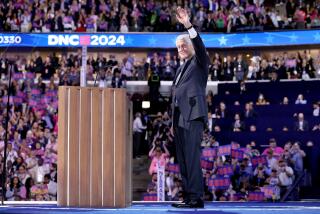Clinton Optimistic About World Events : Presidency: Reflecting on D-day, he says he is upbeat about the future despite ‘ragged edges and uncertainties.’
WASHINGTON — Reflecting on a world with “ragged edges and uncertainties” as the 50th anniversary of D-day approaches, President Clinton said he is more optimistic about the future than when he took office.
“I’m quite encouraged, actually, about the way things are going,” the President told the BBC in one of two interview transcripts released Saturday.
Clinton acknowledged limits on his ability to shape world events but rejected criticisms that his generation of leaders lacks the vision of the Roosevelt-Churchill era.
He added: “I admit there are ragged edges and uncertainties, but that was the case after the Second World War for a few years as well.”
In the second interview, with Italian television, Clinton said he was learning the limits of his power as President but “I am, frankly, more optimistic than I was about the future of the world when I took office.”
Clinton said Harry S. Truman once said the President’s job “largely consisted of trying to talk other people into doing what they ought to do anyway. Sometimes I feel that way, that I don’t have as much power as I thought I would have.”
Speaking of the ongoing bloodshed in Bosnia, for example, he said the United States “cannot impose our will, and we have to be flexible and listening.”
Overall, Clinton said, “The United States is still prepared to lead in a world in which our concerns are clear--security, prosperity, democracy and human rights.”
Clinton echoed similar themes in his weekly radio address, holding out the sacrifice of the D-day veterans as a model for America’s ongoing commitment to freedom.
The President, whose foreign policy has been labeled uneven and ineffective by critics, made it clear that new challenges loomed and there were limits to what the United States could do.
Ethnic and religious hatreds, hunger, economic and environmental devastation, and the threat of spreading nuclear weapons technology all persist, he said.
“In this new era we cannot dispatch our troops to solve every problem where our values are offended by human misery, and we should not,” Clinton said. “But we are prepared to defend ourselves and our fundamental interests when they are threatened.”
In the Republican response to his address, Rep. Gerald B. H. Solomon of New York said one way to honor the nation’s military personnel this Memorial Day weekend is to “give them the tools that just might save their lives.”
He criticized Clinton’s proposed defense cuts, saying the reductions would turn the U.S. military into a “skeleton force” unable to curb aggression and protect American interests abroad.
Clinton flies to Italy on Wednesday to begin an eight-day trip that will culminate in a huge celebration of the Normandy landing on June 6, 1944.
More to Read
Sign up for Essential California
The most important California stories and recommendations in your inbox every morning.
You may occasionally receive promotional content from the Los Angeles Times.










